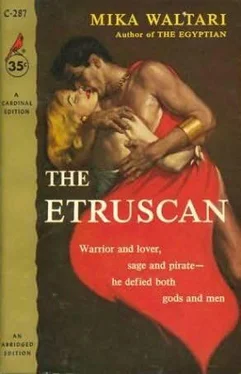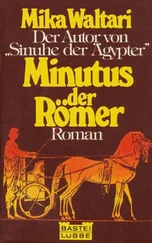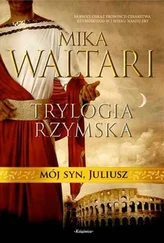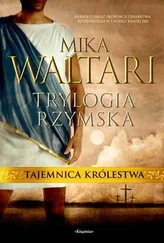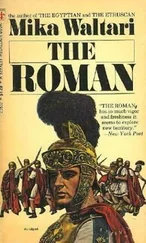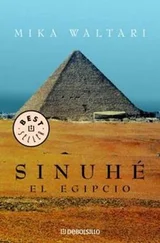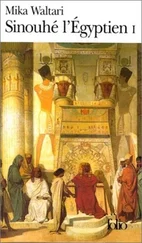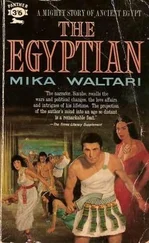Mika Waltari - The Etruscan
Здесь есть возможность читать онлайн «Mika Waltari - The Etruscan» весь текст электронной книги совершенно бесплатно (целиком полную версию без сокращений). В некоторых случаях можно слушать аудио, скачать через торрент в формате fb2 и присутствует краткое содержание. Жанр: Исторические приключения, на английском языке. Описание произведения, (предисловие) а так же отзывы посетителей доступны на портале библиотеки ЛибКат.
- Название:The Etruscan
- Автор:
- Жанр:
- Год:неизвестен
- ISBN:нет данных
- Рейтинг книги:4 / 5. Голосов: 1
-
Избранное:Добавить в избранное
- Отзывы:
-
Ваша оценка:
- 80
- 1
- 2
- 3
- 4
- 5
The Etruscan: краткое содержание, описание и аннотация
Предлагаем к чтению аннотацию, описание, краткое содержание или предисловие (зависит от того, что написал сам автор книги «The Etruscan»). Если вы не нашли необходимую информацию о книге — напишите в комментариях, мы постараемся отыскать её.
The Etruscan — читать онлайн бесплатно полную книгу (весь текст) целиком
Ниже представлен текст книги, разбитый по страницам. Система сохранения места последней прочитанной страницы, позволяет с удобством читать онлайн бесплатно книгу «The Etruscan», без необходимости каждый раз заново искать на чём Вы остановились. Поставьте закладку, и сможете в любой момент перейти на страницу, на которой закончили чтение.
Интервал:
Закладка:
No longer able to resist, I extended my arms to embrace her. They closed over nothing, although I still saw her alive before me. Gradually the objects in the room became visible through her being. I sprang up with a start, my fingers clutching at moonbeams. Disconsolately I paced the room, touching the various objects, but my arms lacked strength to lift even the smallest. Again a feeling of oppression came over me and I struck the gong with my fist to summon a human companion. But no sound emanated from it.
When I awakened I was lying on the couch with my arms crossed tightly over my chest. Finding that I could move my limbs, I sat on the edge of the couch and hid my face in my hands.
Through the incense and the terrifying moonlight I tasted the metallic flavor of immortality and smelled its icy scent. Its cold flame nickered before my eyes, its thunder roared in my ears.
I rose defiantly, flung wide my arms and shouted, “I do not fear you, Chimera. I still live the life of a human. Not an immortal but a human among my own kind.”
But I could not forget. I spoke again to her who ever hovered around me invisibly, protecting me with her wings.
“I confess that all I have done of my own selfish will has been wrong and harmful to myself as well as to others. Only in following your guidance, unknowingly and as one who walks in his sleep, have I unerringly done the right thing. But I must still learn for myself what I am and why I am thus.”
Having clarified that, I taunted her. “It is true that you have done your utmost to make me believe, but I do not. So much a human am I still, I will believe only when I awaken in some other life to the roar of the storm and remember and know myself. When that happens I shall be your equal. Then we can better dictate our terms to each other.”
I took the clay vessel from the feet of the goddess, took one pebble after another in my palm and remembered. And having remembered, I wrote down everything to the best of my ability.
3.
The majority of men never stoop to pluck a pebble from the ground and save it as a symbol of the end of one era and the beginning of another. Thus it is forgivable if relatives place in the vessel a heap of pebbles equaling in number the years and months of the deceased. In that case the pebbles reveal his age but nothing else. He has lived the ordinary life of a human and been content.
Nations also have their eras, known as the centuries of the gods. Thus we immortals know that the twelve Etruscan peoples and cities have been allotted ten cycles in which to live and die. We refer to them as lasting one thousand years because it is easy to say, but the length of a cycle may not necessarily be even one hundred years. It may be more or even less. We know only its beginning and its end from the unmistakable sign we receive.
A man seeks the certainty that cannot be had. Thus the soothsayers compare the liver of a sacrificed animal with a clay model which is divided into compartments, each bearing the name of a particular deity. Divine knowledge is lacking, therefore they are fallible.
Similarly, there are priests who have learned many rules of divining from the flight of birds. But when they are confronted by a sign with which they are not familiar they become confused and make their predictions blindly. I will not even mention the interpreters of lightning who ascend the holy mountains before a storm and confidently interpret the thunderbolts according to color and position in the vault of heaven, which they have quartered and orientated and divided into sixteen celestial regions.
But I shall say no more, for thus it must ever be. Everything grows rigid, everything ossifies, everything ages. Nothing is sadder than obsolescent and withering knowledge, fallible human knowledge instead of divine perception. A man can learn much, but learning is not knowledge. The only fountainheads of true knowledge are inward certainty and divine perception.
There are divine objects of such potency that the sick are healed by touching them. There are objects which protect their bearers and others which harm. There are sacred places which are recognized as sacred although no altar or votive stone marks their site. There are also seers who are able to view the past by holding an object. But no matter how convincingly they speak to earn their porridge and oil, it is impossible to know how much of what they say is true, how much merely dream or fabrication. Not even they themselves know. To that I can testify, for I myself have the same gift.
Nevertheless, something is retained in objects which have been used and loved by people for a long time and which are associated with good or evil. Something beyond the object itself. But all this is vague and dreamlike and fully as illusory as it is true. In the same manner a man’s senses mislead him if they are fed only by his lust, the lust to see, to hear, to touch, to smell, to taste. No two persons ever see or taste the same thing in the same way. Nor does the same person hear or touch the same thing in the same way at different times. Something which is pleasing and desirable at this moment may in a short time be repulsive and worthless. Therefore a person who believes only in his senses lies to himself throughout his life.
But as I write this I know that I do so only because I am old and worn out, because life tastes bitter and the world offers nothing for which I yearn. In my earlier years I would not have written thus, although whatever I would have put down would have been equally true.
Why, then, should I write at all?
I write to conquer time and to know myself. But can I conquer time? That I will never know because I do not know whether writing which has been erased can survive. Thus I shall be content to write only that I may know myself.
But first of all I shall take in my hand a smooth black pebble and write how I had my first presentiment of what I really was, rather than that which I merely believed myself to be.
4.
It happened on the road to Delphi amidst gloomy mountains. When we had left the shore, lightning had flashed in the distant west above the mountain peaks, and upon our reaching the village the people warned the pilgrims against continuing the journey. It was autumn, they said, and a storm was about to break. Landslides might close the road or torrents sweep away the traveler.
But I, Turms, was on my way to be judged by the oracle at Delphi. Athenian soldiers had rescued me and granted me asylum on one of their ships when the people of Ephesus for the second time in my life had tried to stone me to death. Thus I did not stop to await the passing of the storm. The villagers lived off the pilgrims, stopping them coming and going under many pretexts. They prepared good food, offered comfortable beds and sold keepsakes of wood, bone and stone that they had made. I did not believe their warnings, for I was not afraid of storms or lightning.
Driven by guilt, I continued my journey alone. The air cooled, clouds rolled down the mountains, lightning began to flash around me. Deafening claps of thunder echoed ceaselessly through the valleys. Lightning cleft the boulders, rain and hail beat my body, squalls almost swept me into the gorges, stones scratched my elbows and knees.
But I felt no pain. While the lightning blazed around me as though to reveal its awesome strength, ecstasy gripped me for the first time in my life. Without realizing what I did I began to dance along the road to Delphi. My feet danced and my arms moved, not in a dance that I had learned from others, but in a dance that moved and lived in me. My whole body moved in joyous ecstasy.
Then it was that I knew myself for the first time. No evil could befall me, nothing could do me harm. As I danced on the road to Delphi the words of a strange language burst from my lips, words that I did not know. Even the rhythm of the song was strange, as were the steps of the dance.
Читать дальшеИнтервал:
Закладка:
Похожие книги на «The Etruscan»
Представляем Вашему вниманию похожие книги на «The Etruscan» списком для выбора. Мы отобрали схожую по названию и смыслу литературу в надежде предоставить читателям больше вариантов отыскать новые, интересные, ещё непрочитанные произведения.
Обсуждение, отзывы о книге «The Etruscan» и просто собственные мнения читателей. Оставьте ваши комментарии, напишите, что Вы думаете о произведении, его смысле или главных героях. Укажите что конкретно понравилось, а что нет, и почему Вы так считаете.
